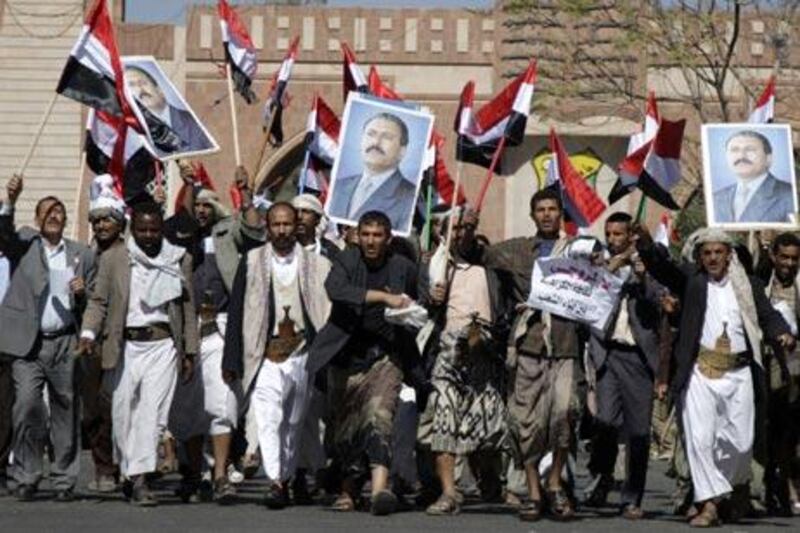SANA'A // At least three anti-government protesters were wounded yesterday when they clashed with pro-government demonstrators during the fifth consecutive day of street protests over the rule of President Ali Abdullah Saleh.
The pro-democracy protesters, inspired by the uprisings in Tunisia and Egypt, marched from Sana'a University towards Mr Saleh's palace demanding he step down after 32 years in power.
Mr Saleh said on February 2 that he would not seek to extend his term when it expires in 2013 and that his son would not succeed him as president.
Supporters of Mr Saleh's General People's Congress, using batons and stones, attacked the protesters, who responded by hurling stones. Police in plainclothes wielding electric tasers sent many who had not already done so fleeing into side streets.
The demonstrators chanted: "The people want to oust the regime", a slogan used by protesteres in Egypt, who forced the president, Hosni Mubarak, to step down on the 18th day of mass protests there.
They also chanted: "Down with the president's thugs," and "O, officers, it is enough poverty and deprivation".
The ruling party supporters disseminated pamphlets in which they described the pro-democracy protesters as traitors. They also handed out a photograph of opposition leaders with the US secretary of state, Hillary Clinton, describing them as "traitors who are serving foreign agenda".
Government security forces have blocked access to public squares and set up tents for government supporters.
Hashem Al Abara, who has been involved in organising the protests through Facebook, said the demonstrators would not be intimidated.
"We will continue with the protests and the ruling party's attacks against our peaceful demonstrations will not set us back," Mr Abara said. "If Egypt stayed 18 days, it will not matter to us if we stay one, two or three months."
In Taiz city, 250 kilometres south of Sana'a, thousands continued protests yesterday for a fifth day, demanding an end to Mr Saleh's rule. His goverment is battling criplling poverty and unemployment as well as a secessionist movement in the south, a rebellion in the north, and al Qa'eda militants.
With the protests showing no signs of ending, Mr Saleh announced yesterday that his office was open "to listen to the views" of "various segments of society from all the republic's provinces".
"These direct meetings between the president and people from various social segments will provide the chance to discuss all the developments and listen to different views to serve the country," the state news agency Saba said.
Yesterday Reporters Without Borders, a Paris-based media watchdog, condemned what it said were attacks on journalists covering the protests,
The organisation "roundly condemns the attacks that security agents, police officers and plainclothes men have carried out against journalists covering street protests in Sana'a during the past two days". The group urged "Yemeni authorities to allow journalists to do their work without fear of being arrested or physically attacked by members of the security forces, who are supposed to protect them".
Abdulkareem Mohammed al Aslami, a member of the ruling party's parliamentary bloc, announced his regisnation from the party yesterday because of the crackdown on "peaceful protesters". Mr al Aslami said in a statement that he was also not happy about the stand of their bloc towards what was happening in the country and its failed efforts to combat corruption.
With addtional reporting by Agence France-Presse and Bloomberg News Service





